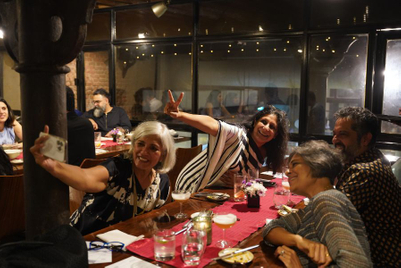
'Yes we can' is the tagline of one of the most significant campaigns of our times, centered on the core proposition of Change.
Within hours of the November 4th US Presidential Election result, when asked by Campaign India to view this phenomenon from the prism of brand and brand ambassadorship, I initially felt that it would be like dissecting an emotion. However it's business as usual and the advertising professional lens had to be picked up.
To start with, Barack's persona has ensured that the brand Obama has no dearth of adjectives. Child of change, he stands tall at the door of future carrying a bag full of virtues such as charisma, dignity, honesty, intelligence and more.
The urge to understand better all aspects of a brand especially this human one, arises not just from a marketing perspective. For today, the brand and its equity are not only relevant in the context of advertising and marketing but even as an element in the ethos of a society, its cultural beliefs and personal philosophies.
Considered from this vantage point, the brand Obama is more of a social commentary —on a society rising above legacy, origin, gender and experience to cross a new frontier.
And it's with concepts, categories and products that are new, the ones that revolutionized the way we think and live, that one can draw a parallel.
Set against varied criteria, there are several categories of new products. For example, some new product concepts are merely minor modifications of existing products while some are completely innovative. Some are new to the market whilst others are new to the company. And then there are a few that are completely novel and create totally new markets.
It's the novel, the revolutionary products and brands that are life changing. They do not need conventional advertising; their very concept permeates the mind. They are the very first in the lives of the people. Like a philosopher's new school of thought, a scientist's invention of a new drug, or even the creation of new musical instrument. Take for example the world's first blood bank established sometime in the 1930s and the path breaking role it played in changing surgical procedures and emergency treatments the world over. Xerox, the silicon chip-the effect of which one doesn't need to wax eloquent about.-3M's Scotch tape and Post it notes, DuPont's Teflon, Henry Ford's assembly line production, the iPod , the concept of genetic mapping – all of these and a plethora of products and services that have been 'firsts' in the field could draw an analogy with Obama.
At its very essence Obama is a revolutionary brand, a 'breakthrough' brand.
However, there must be a degree of Symbiotic evolution between a brand and its potential consumers. An interrelationship, a quantum of interaction in the manner in which a product or a brand evolves. No doubt there existed a need gap that was collectively drawn bigger and deeper for Obama to fill in. He is a case study of where the American citizen and consumer—as perhaps the global one—is moving. His directness and interactiveness in communication, his acknowledgment of the yearning for real products with content and his understanding of the need for a redefined global image is by default and design both, bang on target.
Conceptual understanding of the need gaps, concrete marketing strategies and humane leadership style, this symbiotic brand exemplifies these and perhaps more.
Looked at from another perspective, the projected Brand Image and the Brand experience are both critical to a brand's success. The experiential aspect as we know is the sum of all points of contact with the brand and is termed as Brand experience. The perception, a symbolic form created within the minds of people based on the platform and promise associated with a product or service—distills into a Brand Image. Together these have to be in sync with those of its ambassador or vice a versa.
A temperamentally even "No drama Obama" personified a calm unruffled demeanor. One sans knee- jerk reactions like suspending his campaign midway when the full blown economic crisis erupted or choosing to not react against the vitriolic of being labeled a near terrorist.
Therefore it would be appropriate to associate these very qualities with any experiential brand or service that needs to project stability as its key attribute, especially in trying circumstances. For example, the Financial Services category. As a citizen put it "heck I would love him (Obama) to be my stockbroker in these times".
Moving further, we all understand that Brands are replete with their own rituals, symbols and legacies. There is iconography, an unspoken language in which a brand and a brand ambassador communicates and connects with its patrons. The confluence of vastly divergent mix of these elements in Obama's persona makes him multi-dimensional. In a manner of speaking he is a product of a remix culture. Perhaps that's the reason why most people, black, white, young, old, elitist, commoners, Americans non-Americans see a bit that they can connect with. Obama is a citizen of the world.
He is a global in relatibility and appeal. Drawing on that appeal, there's no dearth of local brands that seek to go global or vice versa can find a resonance.
Personally speaking however, there seems to be deeper connect that Obama has. His projected image—that of a consensus seeking leader, of inclusiveness and interaction, of making each one feel they mattered—translated into action as well. He skillfully maximized modern channels of one-to-one communication like the Internet. Putting videos on You Tube, and presence of Facebook, mails to mobilize rallies, raising $50 donations and responding real time; he and his campaign reached out and touched. It was a Leadership steeped with community activism. His talk of "Believe in not my ability but your own to bring about the change" touched a collective chord. Many say that Obama has resonated with the public as 'Brand Hope'.
But I believe that more than this, it was about recognizing your weaknesses and then your power to move forward despite them, about reigniting self confidence and belief in one's innate ability. It is about being a
catalyst.
Obama exemplifies an Enabler brand.
One that makes you unleash your full potential; one that propels you to 'be' the change.
On a lighter note, if the category of self-help books was a cerebrally respected one, there would have been a pretty natural association. For self-help alludes to self-guided improvement in chiefly, emotional financial or intellectual areas. They not only reflect current problems, hopes and concerns but to a large extent play a role in popular self-education. While largely, self-help treatises are a formation and articulation of personal philosophies, they are also the building blocks of a collective view. In some sense the American citizen's personal and collective worldview broadened and expanded.
Indeed there seems to be a new view which is being shaped. Obama seems to have brought a paradigm shift in the collective consciousness of a society. For, more than a ballot, it was about prejudice's pursuit for redemption, about honesty's search for action, about merit seeking mandate. And when this found validation on November 4th the chant of 'yes we can' resonated for the world to hear.
Having done my duty as an advertising practitioner, let me now turn the tables.
I don't believe that Obama can be categorized as merely a brand or an ambassador. The very reason he has surmounted all odds and made history is because he has put himself outside the Marketing Brand Wagon. Yes, politics is also largely about positioning and projection of an image, of stirring aspirations, building affinity, but he has redefined the playing field. He positioned himself above a race—presidential or otherwise. He does not bring something as simplistic as a new Brand or a new take on politics—but something much more complex. Perhaps this entire phenomenon can be viewed in terms of not a political campaign but in terms of a social movement.
Some shall put forth that even social movements spin off brands.
Well, that's for another article then.
(Prasoon Joshi is executive chairman, McCann Worldgroup India.)


.jpg&h=334&w=500&q=100&v=20250320&c=1)

.jpg&h=334&w=500&q=100&v=20250320&c=1)


.jpg&h=334&w=500&q=100&v=20250320&c=1)
.jpg&h=334&w=500&q=100&v=20250320&c=1)

.jpg&h=334&w=500&q=100&v=20250320&c=1)





.jpg&h=268&w=401&q=100&v=20250320&c=1)


.jpg&h=268&w=401&q=100&v=20250320&c=1)
